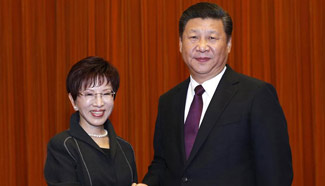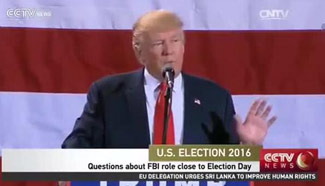BEIJING, Nov. 2 (Xinhua) -- Most economists would agree that foreign direct investment (FDI) is a good thing, however, it is being hindered by protectionist measures.
An obvious victim of FDI protectionism is China, with signs of resistance mounting in the United States, Australia and recently in Europe, too. Measures that have been rolled out to impede FDI are often described as being in the "national interest."
As a result of tightened measures -- in the national interest -- planned Chinese deals worth nearly 40 billion U.S. dollars, or 14 percent of the total, have been scuppered since July 2015.
One possible reason for this Chinese investment-phobia is its explosive growth. Owing to the global economic slowdown, high asset prices and low-interest loans at home, China's outbound investment surged by 53.7 percent year on year in the first three quarters of this year.
Yet, these facts are feeble excuses for restrictions.
After almost four decades of reforms and opening up, Chinese companies have become more market-oriented and profit-driven than many foreigners realize. The prevailing bias, including claims that they are financial tools or weapons of the government, have been repeatedly proved groundless. Investment by Chinese companies has been generally welcomed by recipient countries, and has helped generate jobs and support economic growth.
Although it is not unreasonable for governments to review FDI in "sensitive sectors," some governments are claiming that an extensive range of sectors, from mining to agriculture, are "sensitive" and should be protected.
It is hard to measure how FDI protectionism has contracted global flows, which can be affected by many economic factors beyond government regulations. What is certain, however, is that protectionism has led to certain proposed transactions being denied -- discouraging other potential investors. A situation, such as this, would harm both FDI source and recipient countries and exacerbate the already ailing world economy.
To stem this trend, specific actions are required.
For China, the government needs to accelerate reforms and opening up, reduce red tape and improve access for foreign investment to create a fairer competition environment.
From the relaxing of regulation to the removal of market barriers, China has been, and will remain, committed to openness. However, as Foreign Minister Wang Yi posited, "China is still a developing country, it is neither scientific nor comparable to simply evaluate and measure the investment environment with the standard of highly developed countries."
For Chinese businesses that go global, they must abide by local laws and regulations and make their finances more transparent to gain the trust of foreign regulators.
For foreign regulators, they must extend the same trust to Chinese investors that they give other foreign investors. They must also ensure that investment reviews are conducted transparently, and within a definite time and reference frame.
International cooperation can also help. Communication and policy coordination should be enhanced to ensure countries to safeguard their national interests without distorting investment. Multilateral organizations, such as the G20, should reinforce policies that curb protectionism and, instead, promote global investment.










